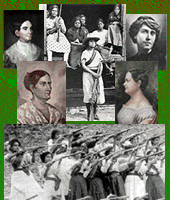"There are many men, and even women, who
criticise the allegedly "unfair" competition
promoted by "quota" systems that ease
women's access to certain sectors or fields of
work. However, statistics show that the number
of women occupying high-level responsibility
positions is still very low or non-existent
despite such quotas"
The European Commission has numerous policies to improve gender equality and gender mainstreaming within the European Union Member States, pre-accession countries, countries recipients of development aid, as well as within the EU institutions.
One example of such a policy is the fourth Action Programme for Equal Opportunities for Women and Men (2004-2008), which contains measures aimed at improving the gender balance among staff. Additionally, the Committee on Women's Rights and Gender Equality of the European Parliament addresses the issues of gender discrimination and equal rights. Some of the competences and objectives of the Committee include:
§ the definition, promotion and protection of women's rights in the Union and related Community measures;
§ the promotion of women's rights in third countries;
§ equal opportunities policy, including equality between men and women with regard to labour market opportunities and treatment at work;
§ the removal of all forms of discrimination based on sex;
§ the implementation and further development of gender mainstreaming in all policy sectors;
§ the follow-up and implementation of international agreements and conventions involving the rights of women; and
§ Information policy on women
Even though policies and decisions on gender equality are currently being implemented, a significant gender deficit and gap still exist. According to the Report on Equality between Women and Men, prepared by the Directorate General for Employment, Social Affairs and Equal Opportunities, women earn 15 per cent less than men despite the European legislation on equal pay.
Women constitute, on average, 30 per cent of entrepreneurs in the EU, and within enterprises, account for only 32 per cent of managers and 10 per cent of board members. Only 3 per cent of CEOs of large enterprises are women.
The same report also shows that within the Commission itself, the situation on gender balance requires considerable improvement. In 2004, category A women officials constituted 31.8 per cent; an increase of almost 10 per cent over the past ten years. The number of female directors was only 13.2 per cent, while women in middle-management positions accounted for 18 per cent.
Work-life balance tensions, combined with stereotypes and gender-biased remuneration and evaluation systems, continue to affect women's careers and make vertical segregation of the labour market very rigid. It seems that even though the institutions are committed to achieving gender equality, women are still prevented from full participation, resulting in a democratic deficit.
Having a more equal representation of women in decision-making positions remains a key challenge for the future. To improve on gender equality, the Commission proposed, in March 2005, to set up European Institute for Gender Equality, which begins its work in 2008. The institute was conceived as a technical support body both for the Member States and for the European institutions; most notably that of the Commission, to ensure the best implementation of Community policy in the field of gender equality. From an optimistic point of view, a combination of these new measures will improve the gender ratio in hierarchical positions.
Rebeca DE SANCHO MAYORAL. Published on “European Stagiaires’ Journal”, May 2007.
Inscription à :
Publier les commentaires (Atom)









.jpg)



Aucun commentaire:
Enregistrer un commentaire